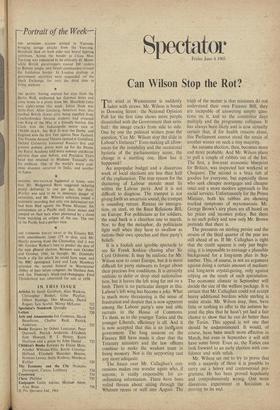Can Wilson Stop the Rot?
THE wind at Westminster is suddenly laden with straws. Mr. Wilson is booed. in Downing Street : the National Opinion Poll for the first time shows more people dissatisfied with the Government than satis- fied : the image cracks from side to side. One by one the political writers pose the question, 'Can Mr. Wilson stop the slide in Labour's fortunes?' Even making all allow- ances for the instability and the occasional hysteria of the parliamentary scene, the change is a startling one. How has it happened?
An unpopular budget and a disastrous week of local elections are less than half of the explanation. The true reason for the shattering of Labour morale must lie within the Labour party. And it is not difficult to diagnose. The trumpet is not giving forthan uncertain sound; the trumpet is sounding retreat. Retreat on immigra- tion, on steel, on the Race Relations Bill, on Europe. For politicians as for soldiers, the road back is a cheerless one to march. Nor, to flog the metaphor, do politicians fight well when they have to swallow as rations their own speeches and their party's beliefs.
It is a foolish and ignoble spectacle to see Sir Frank Soskice chasing after Sir Cyril Osborne. It may be realistic for Mr. Wilson now to court Europe, but it is more difficult for party stalwarts to forget about their precious five conditions, It is certainly realistic to defer or drop steel nationalisa- tion, but it leaves the left wing far out on a limb. There is no particular danger in this. Labour's left wing has become a joke. What is much more threatening is the sense of frustration and despair that is now apparent among the Labour party's new and able recruits in the House of Commons. To them, as to the younger Tories and the younger Liberals, efficiency is all. And it is now accepted that this is an ineftipient government. The long sessions on the Finance Bill have made it clear that the Treasury ministers and the law officers combine to make the weakest team in living memory. Nor is the supporting cast any more adequate. The fiasco over Mr. Callaghan's con- cessions makes one wonder again who, if anyone, is really responsible for co- ordinating information. There have been veiled threats about sitting through the Whitsun recess or Well into August. The truth of the matter is that ministers do not understand their own Finance Bill, they are incapable of answering simple ques- tions on it, and so the committee days multiply and the programme collapses. It has always been likely and is now virtually certain that, if for health reasons alone, this Parliament cannot stand the strain of another winter on such a tiny majority.
An autumn election, then, becomes more and more probable. And Mr. Wilson plans to pull a couple of rabbits out of the hat.
The first, a five-year economic blueprint for Britain, was inspected last weekend at Chequers. The second is a bran tub of goodies for everyone, but especially those who seek cheaper mortgages and cheaper rates and a more modern approach to the social services: Unfortunately for the Prime Minister, both his rabbits are showing marked symptoms of myxomatosis. Mr. George Brown's airy plans are all based on his prices and incomes policy. But there is no such policy and now only Mr. Brown pretends that there is.
The pressures on sterling persist and the strains of the third quarter of the year are still' ahead of us. If Mr. Callaghan is right that the credit squeeze is only just begin- ning, it is impossible to envisage a plausible background for a long-term plan in Sep- tember. This, of course, is not an argument against doing a certain amount of medium- and long-term crystal-gazing, only against relying on the result of such speculation. The economic climate in September will decide the size of the welfare package. It is certain that Mr. Callaghan could not accept heavy additional burdens while sterling is under strain. Mr. Wilson may, then, have little or nothing to offer in the autumn be- yond the plea that he hasn't yet had a fair chance to show that he can do better than the Tories. This appeal is not one that should be underestimated. It would, of course, have been much more effective in March, but even in September it will still have some force. Even so, the Tories can look forward to an early election with con- fidence and with relish.
Mr. Wilson set out to try to prove that with a majority of three it is possible to carry out a heavy and controversial pro- gramme. He has been proved hopelessly and comprehensively wrong. One more disastrous experiment in Socialism is moving to its end.


































 Previous page
Previous page